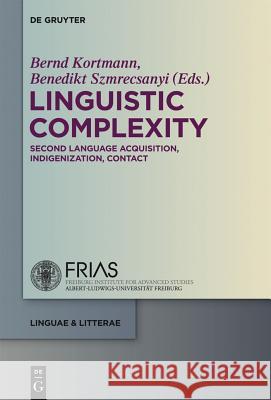Linguistic Complexity: Second Language Acquisition, Indigenization, Contact » książka
Linguistic Complexity: Second Language Acquisition, Indigenization, Contact
ISBN-13: 9783110229219 / Angielski / Twarda / 2012 / 270 str.
Linguistic complexity is one of the currently most hotly debated notions in linguistics. The essays in this volume reflect the intricacies of thinking about the complexity of languages and language varieties (here: of English) in three major contact-related fields of (and schools in) linguistics: creolistics, indigenization and nativization studies (i.e. in the realm of English linguistics, the "World Englishes" community), and Second Language Acquisition (SLA) research: How can we adequately assess linguistic complexity? Should we be interested in absolute complexity or rather relative complexity? What is the extent to which language contact and/or (adult) language learning might lead to morphosyntactic simplification? The authors in this volume are all leading linguists in different areas of specialization, and they were asked to elaborate on those facets of linguistic complexity which are most relevant in their area of specialization, and/or which strike them as being most intriguing. The result is a collection of papers that is unique in bringing together leading representatives of three often disjunct fields of linguistic scholarship in which linguistic complexity is seen as a dynamic and inherently variable parameter.











